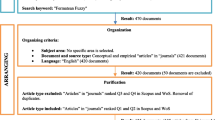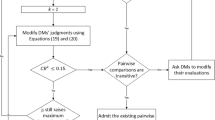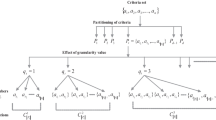Abstract
As one of the key research topic in multi-criteria group decision making (MCGDM), aggregation operator has been drawn widespread concern from academics and practitioners. In order to reflect the characteristics of human decision, it is necessary to introduce an operator with compensation ability to close the gap between the theoretical results and experimental results. Based on generalized compensative weighted averaging operator, intuitionistic linguistic generalized compensative weighted averaging (ILGCWA) operator, intuitionistic linguistic generalized compensative ordered weighted averaging (ILGCOWA) operator, and power generalized compensative weighted averaging aggregation (ILPGCWA) operator are developed in this paper. These operators provide two additional parameters to represent decision makers’ attitude and decision makers’ preference for all kinds of alternatives in the aggregation process, respectively. Moreover, some special cases with regard to the generalized parameters p and \(\lambda \) are investigated in detail in ILGCWA operator and ILGCOWA operator. Some examples are employed to illustrate the effectiveness of the proposed methods, which can be applied to solve MCGDM problem with intuitionistic linguistic information.
Similar content being viewed by others
References
Aggarwal M (2015a) Compensative weighted averaging aggregation operators. Appl Soft Comput 28:368–378
Aggarwal M (2015b) Generalized compensative weighted averaging aggregation operators. Comput Ind Eng 87:81–90
Atanassov KT (1986) Intuitionistic fuzzy sets. Fuzzy Sets Syst 20(1):87–96
Dyckhoff H, Pedrycz W (1984) Generalized means as a model of compensation connectives. Fuzzy Sets Syst 14(2):143–154
Herrera F, Herrera-Viedma E (1997) Aggregation operators for linguistic weighted information. IEEE Trans Syst Man Cybern A Syst Hum 27(5):646–656
Ju YB, Yang SH (2015) A new method for multiple attribute group decision-making with intuitionistic trapezoid fuzzy linguistic information. Soft Comput 19:2211–2224
Lan JB, Chen YW, Ning MY, Wang ZX (2015) A new linguistic aggregation operator and its application to multiple attribute decision making. Oper Res Perspect 2:156–164
Liu PD (2013) Some generalized dependent aggregation operators with intuitionistic linguistic numbers and their application to group decision making. J Comput Syst Sci 79(1):131–143
Liu PD, Tang GL (2016) Multi-criteria group decision-making based on interval neutrosophic uncertain linguistic variables and Choquet integral. Cognit Comput 8(6):1036–1056
Liu PD, Wang YM (2014) Multiple attribute group decision making methods based on intuitionistic linguistic power generalized aggregation operators. Appl Soft Comput 17:90–104
Liu J, Li WJ, Chen SW, Xu Y (2014) An axiomatizable logical foundation for lattice-ordered qualitative linguistic approach for reasoning with words. Inf Sci 263(1):110–125
Merigo JM, Casanovas M, Martnez L (2010) Linguistic aggregation operators for linguistic decision making based on the Dempster-Shafer theory of evidence. Int J Uncertain Fuzziness Knowl Based Syst 18(3):287–304
Wang JQ, Li HB (2010) Multi-criteria decision-making method based on aggregation operators for intuitionistic linguistic fuzzy numbers. Control Decis 25(10):1571–1574
Wang XF, Wang JQ, Yang WE (2014a) Multi-criteria group decision making method based on intuitionistic linguistic aggregation operators. J Intell Fuzzy Syst 26(1):115–125
Wang JQ, Lu P, Zhang HY, Chen XH (2014b) Method of multi-criteria group decision-making based on cloud aggregation operators with linguistic information. Inf Sci 274:177–191
Wang XF, Wang JQ, Deng SY (2015a) Some geometric operators for aggregating intuitionistic linguistic information. Int J Fuzzy Syst 17(2):268–278
Wang XF, Wang JQ, Deng SY (2015b) Some geometric operators for aggregating intuitionistic linguistic information. Int J Fuzzy Syst 17(2):268–278
Xiao GQ, Li KL, Zhou X, Li KQ (2016) Efficient monochromatic and bichromatic probabilistic reverse top-k query processing for uncertain big data. J Comput Syst Sci. doi:10.1016/j.jcss.2016.05.010
Xu ZS (2004a) Uncertain linguistic aggregation operators based approach to multiple attribute group decision making under uncertain linguistic environment. Inf Sci 168:171–184
Xu ZS (2004b) EOWA and EOWG operators for aggregating linguistic labels based on linguistic preference relations. Int J Uncertain Fuzziness Knowl Based Syst 12(06):791–810
Xu ZS (2005) An overview of methods for determining OWA weights. Int J Intell Syst 20(8):843–865
Xu ZS (2006) On generalized induced linguistic aggregation operators. Int J Gen Syst 35(1):17–28
Xu YJ, Da QL, Liu XW (2010) Some properties of linguistic preference relation and its ranking in group decision making. J Syst Eng Electron 21(2):244–249
Yager RR (2001) The power average operator. IEEE Trans Syst Man Cybern A Syst Hum 31(6):724–731
Yu SM, Wang J, Wang JQ (2016) An extended TODIM approach with intuitionistic linguistic numbers. Int Trans Oper Res. doi:10.1111/itor.12363
Yue ZL (2011) An extended TOPSIS for determining weights of decision makers with interval numbers. Knowl Based Syst 24:146–153
Zadeh LA (1965) Fuzzy sets. Inf. Control 8(3):338–356
Zhou X, Li KL, Zhou YT, Li KQ (2016) Adaptive processing for distributed skyline queries over uncertain data. IEEE Trans Knowl Data Eng 28(2):371–384
Acknowledgements
This work was supported by the Natural Science Foundation of China (No. 61203283), Liaoning Provincial Natural Science Foundation of China (Nos. 2014025004, 201602064) and the Fundamental Research Funds for the Central Universities (Nos. 3132016306, 3132017048).
Author information
Authors and Affiliations
Corresponding author
Ethics declarations
Conflict of interest
The authors declare that they have no conflict of interest.
Ethical approval
This article does not contain any studies with human participants performed by any of the authors.
Additional information
Communicated by V. Loia.
Rights and permissions
About this article
Cite this article
Wang, L., Wang, Y., Sangaiah, A.K. et al. Intuitionistic linguistic group decision-making methods based on generalized compensative weighted averaging aggregation operators. Soft Comput 22, 7605–7617 (2018). https://doi.org/10.1007/s00500-017-2734-0
Published:
Issue Date:
DOI: https://doi.org/10.1007/s00500-017-2734-0




